Prevent Mental Aging with Chinese Medicine
In TCM, mental activities including emotions are referred as shen (spirit), which is closely correlated with the functional activities of internal organs. One's spiritual outlook reflects the general vitality of the human body.
As we grow older, physical deterioration leads to mental weakness causing intellectual difficulty, poor memory, slow response rate, sadness, anxiety, fatigue, changes in sleeping or behavior patterns. These will be reflected in beauty problems such as sallow skin, dark circles, dull complexion or other premature signs.
TCM holds that shen is housed in the heart, which provides blood and qi (vital energy) as material basis for it to function. The blood and qi are sourced from the spleen, and the liver takes charge of regulating the shen to work properly, in particular of emotional responses. As a result, mental aging is mostly associated with the heart, liver and spleen. TCM management of mental health is to assure the good condition of these three organs. This includes nourishing the heart, invigorating the spleen and soothing the liver.
1. Nourishing the heart to calm the mind
First of all, a right attitude to life and good lifestyle habits are important for a peaceful mind. Civilized activities like hobbies, painting, traveling, making friends, listening to music, and reading are excellent in keeping the mind calmed, and these will greatly slow down the aging of shen in the heart. See "The Chinese Way of Mind Cultivation".
Aging along with heart deterioration, that is, when the heart fails to rule the shen properly, mental activities will decline, and insomnia, nightmares, poor memory, low spirit, excitability, panicky, a tendency to heart throb and nervous sweating will appear. Ingredients benefit for replenishing blood to the heart are sour jujube seed, schisandra, red sage root, longan aril, Chinese senega (yuan zhi), dates, poria, lily buds, honey, milk, lotus seed and root. They enhance the ability of the heart to rule the shen and minimize the mental problems of aging.
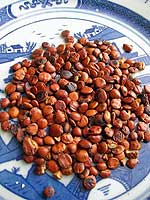 |
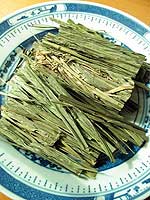 |
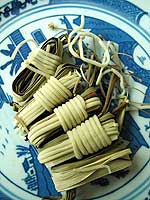 |
Sour jujube seed |
Lophatherum herb
(dan zhu ye) |
Common rush |
In some cases, the heart is hyperactive and accumulated excessive fire leads to dizziness, excitability, irritability, confusion, mania, agitation, frenetic movement and delirium. Ingredients for clearing heart fire include lophatherum herb (dan zhu ye), common rush, fresh rhemannia root, lotus seed cores, gardenia fruit, golden thread rhizome, white chrysanthemum, bitter melon, loofah, watermelon, mung beans and leaf mustard.
Liquorice, Wheat & Jujube Decoction (Gan Mai Da Cao Tang) and Heaven King Heart-Nourish Pellets (Tian Wan Bu Xin Dan) are two famous prescriptions for the above conditions. The former (attached picture) nourishes the heart to calm the mind, the later promotes yin and calms the mind.
An adequate amount of sleep and massage of the head and foot regions are also good for calming the mind.
2. Invigorating the spleen to refresh the mind
In TCM, overuse of the brain is harmful to qi circulation, and will greatly exhaust the blood in the heart and spleen. In overuse of the brain, the body tends to have stagnate qi, blood stasis or accumulated excessive metabolic wastes internally, making the affected individual liable for various health risks from middle age onwards. Regular exercise is especially important, which helps to relieve mental stress, and promotes qi and blood flows. However don't over exert the body, gentle exercises are more proper for strengthening muscles, promoting blood supply to the brain and refreshment.
For mental exhaustion, tonics with ingredients such as pilose asiabell root (dang shen), poria, Chinese yam, largehead atractylodes root (bai shu), lotus seeds, dates, longan aril, pumpkin and mushrooms should be used. These ingredients are beneficial for mental workers who present with fatigue, poor memory and insomnia. Other symptoms such as absentmindedness, difficulty in concentration, generalized heaviness, vertigo, thoracic oppression and blurred vision that TCM maybe due to phlegm and dampness. Common ingredients for resolving these problems are tangerine peel, pinellia tuber (ban xia), poria, coix seed, hyacinth beans, radish, hawthorn fruits, bamboo shavings, gynostemma pentaphyllum (jiao gu lan) and Chinese yam. Restore the Spleen Decoction (Gui pi tang) is a representative prescription for the exhausted individuals who had signs like heart palpitations, forgetfulness, insomnia, night sweats, poor appetite, fatigue and sallowness.
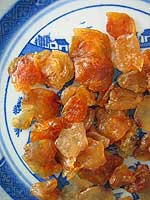 |
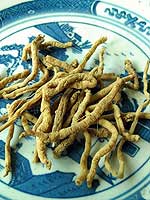 |
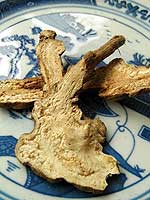 |
Longan aril |
Chinese senega
(yuan zhi) |
Largehead atractylodes root
(bai shu) |
Individuals are advised to have a balanced and easily digested diet, and reduce the amount of frozen and raw foods eaten.
3. Soothing the liver to relieve mental stress
Long-term emotional problems such as depression, irritability and anger are harmful to brain health and greatly contribute to premature aging. In TCM theory, the liver plays an important role in regulating emotional reactions. Normal emotional health depends on the harmony of qi and blood. When the liver keeps qi flowing smoothly, a relaxed internal, emotional environment is created. Some of the health risks associated with emotional instability can be resolved by the following:
| Promoting the liver's ability to flow |
In TCM, emotional instability is regarded as a state of "liver qi stagnation", where the qi flow in the body is interrupted leading to physical disharmony and imbalance. TCM can relieve this by herbs like nutgrass (xiang fu), turmeric root-tuber (yu jin), finger citron fruit, Chinese tororwax root (chai hu), tangerine peel, rose, jasmine and white peony root. They promote the liver's regulating ability and reduce physical damages caused by mental stress. |
| |
| Replenishing liver blood |
Insufficiency of liver blood causes dizziness, insomnia, irritable and dream disturbed sleep. Associated signs are dry eyes, blurred vision, ear ringing, rib discomfort, lusterless face, brittle nails, limbs numbness, tendon and muscle spasms and menstrual problems. TCM holds that "protracted watching injures the blood", therefore, the above conditions are more often seen in those who spend a long time reading. Common nourishing ingredients are angelica root, donkey-hide gelatin, fleece flower root, processed rhemannia rhizome, mulberry fruit, litchi aril, wolfberry fruit, golden needle and animal liver. Sore Jujube Seed Decoction (Suen Zao Ren Tang) is a well known formula for irritability and insomnia in this situation. |
| |
| Clearing liver fire |
Liver fire usually results from a stressful and unhealthy lifestyle over a long time. In addition to emotional instability and irritability, the sufferer may also has insomnia, dizziness, ear ringing, bloodshot eyes, a flushed face, facial spots, constant thirst, a bitter taste in the mouth, indigestion, acne, constipation, yellowish urine and hypertension. Herbs used to treat these problems include Chinese gentian root (long dan cao), gardenia fruit, baical skullcap root (huang qin), virgate wormwood herb (yin chen), selfheal fruit spike, chrysanthemum and white peony root. Chronic patients may occasionally have emotional irritability due to virtual fire caused by yin deficiency of the liver and kidney. Physicians will clear this kind of virtual fire by Chinese cypress bark (huang bai), anemarrhena rhizome (zhi mu) , wormwood (qing hao), turtle shell, peony root bark, oriental water-plantain root and celery.
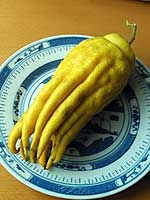 |
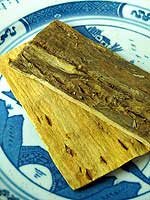 |
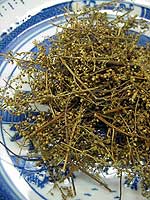 |
Finger citron fruit |
Chinese cypress bark
(huang bai) |
Wormwood (qing hao) |
|
|